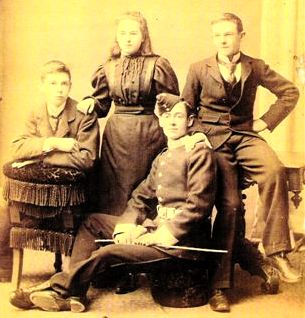 Harry in uniform with half-siblings
Sidney, Eveline & Billy Blencowe
Harry in uniform with half-siblings
Sidney, Eveline & Billy Blencowe
| Blencowe Families' Association Newsletter | Vol. 22 No. 2 May 2007 |
Tricia Wales writes, “Jill Dudbridge and my father were cousins. Both her father, Sidney Blencowe, his brother, Billy and half brother, Harry Blencowe were in the Wiltshire Yeomanry and fought in the Boer War.
 Harry in uniform with half-siblings
Sidney, Eveline & Billy Blencowe
Harry in uniform with half-siblings
Sidney, Eveline & Billy Blencowe
|
I looked for the Wiltshire Yeomanry on Google and found the South African Military History Society Journal in which I found an account of the part played by the Wiltshire Yeomanry in the Boer War. I trawled through the accounts of the various battles and stumbled upon a Corporal Blencowe saving the day and demonstrating the family trait of using your gumption to get out of tight situations!!!!
Jill and I are unsure of which brother the Corporal Blencowe was but I am trying my best to find out, with the help of my younger son, George Blencowe Bain, who is very interested in military history and extremely proud to have a hero in the family!!!”
Following Tricia's advice I found the journal and it is a lengthy blow-by-blow account of what happened written in an easy to read manner with the names of soldiers liberally sprinkled throughout. I have decided to include random paragraphs as an example of how war was the recorded.
“It was the African winter, and though frost is rare in the day time, the nights were bitterly cold, the men's water bottles being nothing but a solid mass of ice in the mornings. There was none of the pomp and glory of war, none of the stirring excitement of a pitched battle and the glorious exaltation brought by a decisive victory. The troops plodded on, through icy winds, dust and rain, snow and hail; ill clothed, fed on the coarsest food and not too much of that; sleeping on the ground with no covering but a ragged blanket; under fire night and day from an unseen and elusive enemy and bearing all with a cheerful and dogged endurance beyond all praise...”
“They had been in the battle field for some time, when.on 20 August, 1900 Colonel Ridley, Imperial Yeomanry was ordered to move his 300 mounted troops towards the Doornberg hills and join with a small column under Colonel Sitwell. The Boers' General Olivier got wind of this and attacked with his entire commando...”
“The Boers opened fire which lasted until late in the afternoon, when an attempt to rush the trenches was easily repulsed. The firing continued all the next day; no one could leave the trenches for food or water, except at night at considerable risk, for rifle fire was kept up all the time. The horses and oxen brought into the lines and hidden, some in a cave and others in a ravine, were killed by shell fire, their position having been given away to the Boer gunners by an escaped prisoner; also the wagons and water barrels were smashed to pieces. Meanwhile Sir G. Lagden, with thousands of Basutos, had been watching the fight's progress from the hills across the river, and had been trying to communicate with the besieged by heliograph. But Major White had no signalling apparatus, and was unable to reply until Corporal Blencowe, a Devizes man, who had acquired a slight knowledge of signalling in the Volunteers, improvised one with a bit of looking glass. A message was then received, saying that General Bruce Hamilton was on his way with 5,000 men to relieve them. This message was also read by the Boers, who, disregarding their leaders' urging them to storm the fort began to slip away. By Wednesday morning, the commando had disappeared. The relieving column came in at mid-day, and tried to pursue the Boers but they got clean away...”
“Surely England owes a debt of gratitude to her gallant sons in the Yeomanry who, for the most part, accustomed to a life of easy plenty, cheerfully underwent not only the dangers of war but what is infinitely more trying, the hardships and exposure inevitable to this campaign animated only by a sense of patriotic duty”.
From Military History Journal - Vol 2 No 1
Sidney, and Harry Blencowe survived the Boer War; Sidney went off to Argentina to build the railways, Harry migrated to Australia while Billy, William Edward Walley Blencowe, remained in the army as a regular and was killed at Ypres in 1914. He left a wife and four children.
![]()
| Blencowe Families' Association | Vol. 22 No. 2 May 2007 | |
| Home Page | Newsletter Archive | Table of Contents |